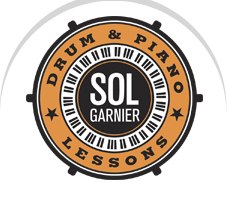I’ve been teaching for a long time now. Since 1989, to be precise. Before the dinosaurs, yes. One of the question that seems to come often is “What is the point of playing music?” Actually, that’s not exactly the question my students ask, more the question I ask them to think about.
Now, let’s see the process. You’ve got a player that has prepared a piece, whether on the piano or the drums, it doesn’t matter. She sweated all week long to tackle the sticking, the fingering, to put the cogs together and then made sure that said cogs were fitting together into a nice flowing piece of music. Some of them played those songs to an adoring crowd, usually a friend or a relative and they got good results: applause, cheers, a hug or a handmade dessert after dinner. The student is feeling like she’s walking on solid ground. So, she comes to her lesson confident to blow me away. I am always ready to dish out compliments. Always. And I dish out a lot of them. But, there is a question that can sabotage their joy: “What is the piece you just played about?” Meaning this: what emotion is attached to the notes of music?
Ah, that’s when I lose too many of them. “Emotion? What emotion?” It’s such a difficult question that I sometimes hesitate to ask it. Yet, it is a necessary one. Music, music with or without words is about only one thing: emotions. Which, if you follow me into the rabbit hole, leads to another question: “What did you try to express when you played?” This one is even more puzzling. And almost unfair, too. Look, they played all the notes, all the dynamics, all the correct tempos, they worked really hard on this, isn’t it enough? Unfortunately not. Music is about one thing only: emotion. That’s the only element worth anything for an audience, that’s the proverbial handrail in a dark staircase. We rely on it to guide us to the end of the tune. We want to feel something. Why do you think performers are so entertaining? Their contort and grimace with a tortured face because they are desperately trying to convey their inner feelings. Very entertaining to watch. And it’s all across the music world, even in classical music, a genre that can be misconstrued as static. Case in point: watch the conductor of a symphony orchestra, these guys leap into the music with everything they’ve got.
I hope you now understand the validity of my question to the student who practiced everything right but forgot to put a little gut to propel the notes she’s playing.
I’ll tell you a secret: if people play music it is almost always to find out who they are. But they don’t want a superficial answer, they want to know what’s inside, really deep. Emotion will get them there. No other way. Once they know not only how to react to something but try to project that reaction, they have a better idea of what they’re made of. It’s pretty simple. Only, you have to go through the notes, and played correctly. I understand that it’s a lot of hurdles to go through but, in the words of the famous Quincy Jones: “You don’t have freedom in music until you have total restriction. You restrict yourself and establish the periphery, and then you have freedom in music.” Freedom is not emotion, the quote doesn’t fit, or so you think. I’ll stop and leave you with that little riddle. That’ll give you a nice way to start the year.

